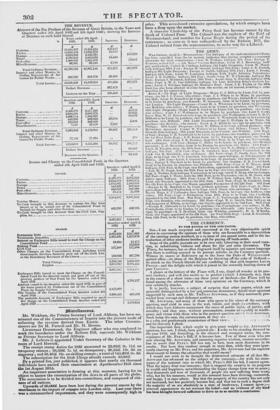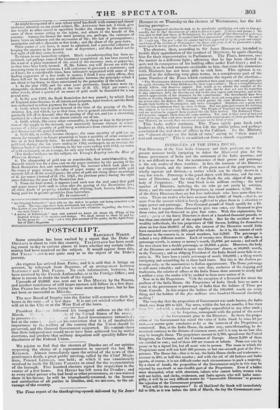THE CURRENCY.
TO THE EDITOR Or THE SPECTATOR,.
SIR-I am much surprised and concerned at the very objectionable spirit shown in canvassing the opinions of those who are favourable to a depreciation of the existing money standard, to a re-issue of one pound notes, and to the in- troduction of other mediums besides gold for paying off bank-notes. Some of the public journals are to be sure only labouring in their usual voca- tion, in substituting violence and abuse for fair and calm discussion. The Times, for instance, has so often disgraced itself by injustice and coarse language that there is nothing unusual in its present articles on the Currency question. Witness its sneers at Reformers up to the hour the Duke of WELLINCTOH quitted office-its abuse of the Belgians for throwing off the yoke of Holland- its attack on the French liberals for not confiding in that arch imposter Lours. Pnirar-and the delight with which it joined in the cowardly hunting-down of poor COLLINS. A glance at the history of the Times will, I say, dispel all wonder at its pre- sent conduct; and will also enable us to predict (which I distinctly do), that in the course of a short time-say three years at farthest-the Times will be found among the advocates of those very opinions on the Currency, which it now so bitterly attacks. It is justly, however, a subject of surprise that other papers, which are generally distinguished by a fair and courteous demeanour, should treat opinions supported by such men as Mr. THO3IAS ATTWOOD, as if they necessarily pro- ceeded from corrupt and dishonest motives. Mr. krxwoon, and many of those who agree in his views of the currency question, need yield to none in the zeal, talent, and single-heartedness, with which they have hitherto maintained the cause of public right, of justice, and morality ; and they may, without presumption, assume an equality in intelli- gence and virtue with those who in the present question attcrk their doctrines. Such being the case, the currencymen, as they are to a calm and gentlemanly examination of their view,. '1 ,liey
and for this only I plead.
One important fact, which ought to give great weight to Mr. ATTWoOn'S opinions, has not, I think, been pointed out : I refer to his standing forward in the.year 1819, and foretelling, in the clearest and strongest terms, the con- sequences of Mr. PEEL'S Bill, if it become law. Few of those even who are now abusing Mr. ATTWOOD, and assuming superior wisdom, venture neverthe- less to assert that PEEL'S Bill has not, in fact, been most disastrous in its results. But have they candour enough to state that, while they were igno- rantly cheering on Mr. PEEL and his majorities, Mr. ATEWOOD had the superior discernment to foresee the calamities that would ensue?
I would not wish to be thought the determined advocate of all that Mr. ATTWoon has advanced on the subject of the currency,-for with his state- ments of the national ruin to which Mr. PEEL'S Bill has led, I cannot agree. That the injury done was immense; that it stopped the country in its progress- to wealth and happiness, notwithstanding the happy change from war to peace; that thousands and tens of thousands of people are now suffering from want, who, but for his measure, would at this moment have been thriving, contented, and happy, I at once admit. But that the property of the.country has not only not increased, but has positively become less, and that too to such a degree that the majority of us are absolutely in a state of insolvency, I cannot agree ;- external appearances do not warrant the belief-and no evidence of any kind has been brought forward sufficient to drive us to so terrible a conclusion. As might be expected of a man whose mind his &felt with earnest and althost exclusive attention on one grand subject, Mr. ATTWOOD does not, I think, give due weight to other causes in operation besides the change in the currency : some of these causes acting to the injury, and others to the benefit of the country. Among the former the most pressing are, perhaps, the existence of heavy taxes on industry and the necessaries of life; the law of primogeniture; monopolies and other obstacles to free trade; and the abuse of the poor-laws.
These causes of evil have, it must be admitted, had a powerful influence in keeping the country in its present state of depression ; and they should not be lost sight of till they cease to exist. To return to our immediate subject. Much misunderstanding has been oc- casioned, and perhaps some of the treatment complained of, has been caused by the want of a plain statement of the creed of the currency men, or papgrites, as they have been lately termed. If, Mr. Editor, you will favour me with the necessary,.room in your columns, I will endeavour to give such a statement ; and as I have, for a considerable time, been intimately acquainted with some of the leading supporters of a free trade in money, I think I may safely affirm, that there will not be found any material difference between the principles which I am about to lay down, to those entertained by the generality of the school. 1. In the year , 1797, and for some years previously, bank-notes were ex- changeable, on demand, for gold, at the rate of 31. 17s. 10?..d. per ounce; in other words, about a quarter of an ounce of gold could be demanded for a one pound note. 2. In the year 1797, the Bank Restriction Act was passed ; by which Bank of England notes became, to all intentsandpurposes, legal tenders, and the Bank was authorized to refuse payment for them in gold. 3. Gold, which was in great demand at the time of the passing of the Re- striction Act, and which, up to that time, was in general circulation as money, gradually fell off in demand, after the passing of that act, and (as a circulating medium) in a short time, went almost entirely out of use. 4. Gold, which, like every other commodity, is cheap or dear in the propor- tion of the supply to the demand, now necessarily became cheaper in conse- quence of a large quantity of gold being withdrawn from circulation as money, and thrown into the general market. 5. Gold did, in reality, become cheaper ; the same quantity of gold (as an ounce, for example) no longer procuring so large a quantity of other commodi- ties as it had formerly done. In exchange for corn, for instance, an ounce of gold had, during the ten years ending in 1792, exchanged, on an average, for thirteen bushels of wheat ; whereas, in the ten years ending with 181'2, an ounce of gold exchanged, on an average, for only nine bushels of wheat. t For further evidence on this subject, see Young's Inquiry into the Rise of Prices in .Europe.] 6. The cheapening of gold was so considerable, that notwithstanding the discredit which was for a time cast on the paper currency by the passing of the Bank Restriction Act, and notwithstanding the increase which took place in the issues of paper money, the value of paper money as compared with gold scarcely fell at all for several years; the price of gold not rising above an average of 4/. per ounce (instead of 31. 17s. 1O d., the previous price) during the eight years following the year of the Restriction Act. 7. From the fists stated, it appears (and such was the real case) that gold and paper money both sank in value after the passing of the Restriction Act ; all other kinds of property, whether food, clothing, land, houses, labour, &c.., being paid for in greater quantities than heretofore. [To be continued.]





















 Previous page
Previous page